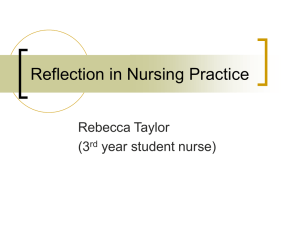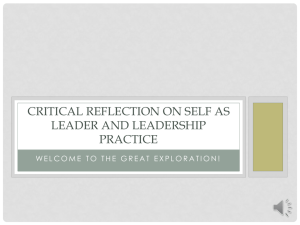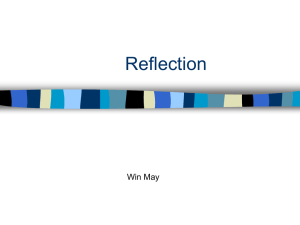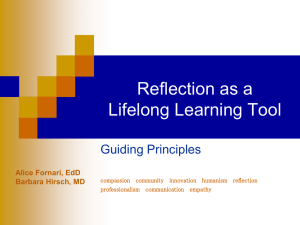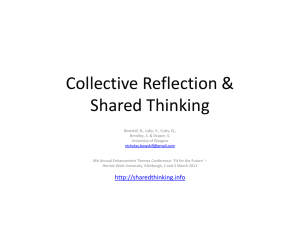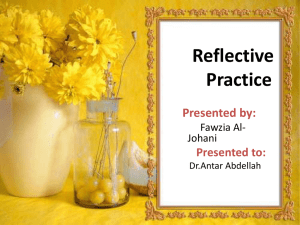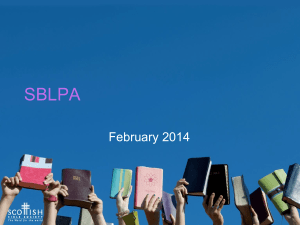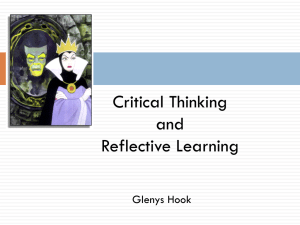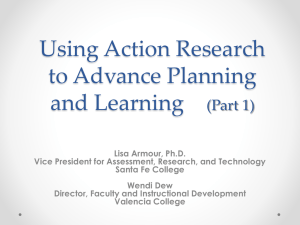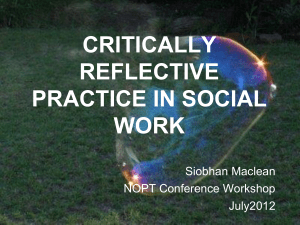Becoming-a-Reflectiv.. - University of Bradford
advertisement
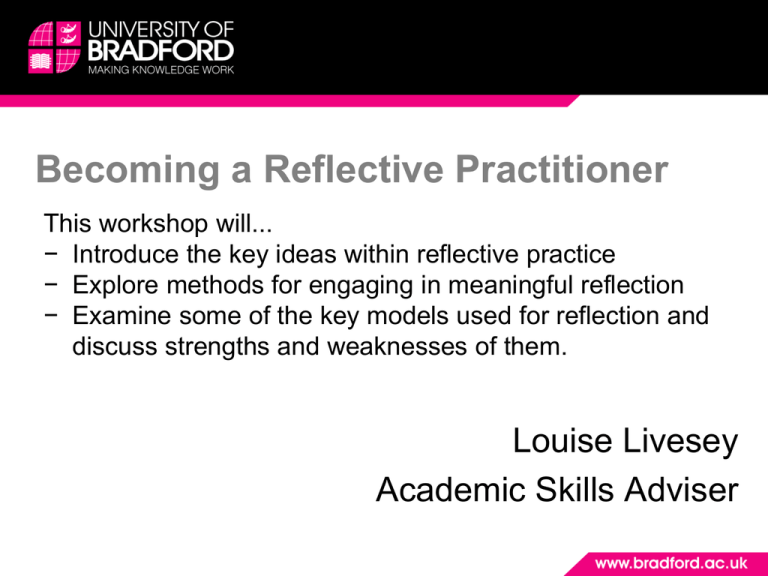
Becoming a Reflective Practitioner This workshop will... − Introduce the key ideas within reflective practice − Explore methods for engaging in meaningful reflection − Examine some of the key models used for reflection and discuss strengths and weaknesses of them. Louise Livesey Academic Skills Adviser The Plan… 1. What reflection is 2. Components and stages of the reflection process 3. Reflective skills 4. Models of reflection 1.What reflection is “Those who cannot remember the past are condemned to repeat it.” George Santayana 1.What reflection is What reflection is and its importance What is it? Why is it important? - The ability to use past experience to inform future action. - You don’t rely on others to learn, grow and improve. - The active allocation of time to this review of past experience. - You take forward positives and develop strategies to deal with negatives. - During this time, the analysis of that past experience to identify its features, components, causes and effects. - It adds to your critical thinking toolkit. - It improves the experience of those you serve, help or work with through your self-development. - Graduate-level professions rarely want unthinking people who cannot learn from mistakes or enhance the field they work in. - The identification of where help, improvement, knowledge or support can be gleaned from. - The commitment to an idea that nothing is perfect – everything can be built upon. 1.What reflection is Reflection is NOT… X Conveyance of information, instruction or argument X Straightforward description X A straightforward decision X Simple problem-solving 2.Components and stages of the reflection process Three components of reflective practice (Jasper, 2013:3) Action That results from new perspectives taken That enable a person to learn from experiences Reflective processes An experience Things that happen to a person 3.Reflective skills Skill Cycle Change Evaluation Selfawareness Synthesis Description Critical analysis 3.Reflective skills Skills required for reflection • Description: who, what, when and summarising • Synthesis: Small detail to big pictures, and making connection to develop new thinking • • • • Change: making choices Critical analysis: dissect, evaluate, decision Evaluation: judgements Self-awareness: how affect and affected by a situation 4.Key reflective models Three models • The Three ‘whats’: example • Kolb’s cycle of reflection: • Gibb’s cycle of reflection: Activity 3 Strengths and weaknesses? References Atkins S, Murphy K. (1993) Reflection: a review of the literature. Journal of Advanced Nursing. 18: 118-119 Blomfield R. Hardy. In Trender L & Reynold S, Eds (2000) Evidence Based Practice- A Critical Appraisal. Oxford: Blackwell Science. Eraut M. (1994) Developing Professional Knowledge and Competence. Abingdon: Falmer International Association of Firefighters. (2004) What is the Tuckman model of team development? Washington: International Association of Firefighters. [online] Available at: https://www.iaff.org/ET/JobAid/LHRC/What_is_the_Tuckman_Model_of _team_development_.htm [Accessed 18.2.14] References Brigden, D. and Purcell, N (2014) Focus: Becoming a reflective practitioner. York: Higher Education Academy. [Online] Available at: http://www.heacademy.ac.uk/resources/detail/subjects/medev/Focus_Becoming_a_reflective_practitioner [Accessed 17.2.14] Jasper, M. (2013) Beginning reflective practice. 2nd ed. Andover: Cengage Learning. Moon, J.A. (2004) Reflection in learning and professional development. 2nd ed. London : Routledge. Moon, J.A. (2009) A handbook of reflective and experiential learning : theory and practice. Abingdon: RoutledgeFalmer. Perkins E.R. (2006) ‘Training and Education’. Evidence Health Promotion. UK: Wiley Spiro, J., Williams, K., and Woolliams, M. (2012) Reflective Writing. Basingstoke: Palgrave Macmillan. Taylor, J.L., and Svensson, J. (1999) Radiography Student Guide Cambridge: Anglia Polytechnic University. Academic Skills Advice Service • Where are we? Chesham Building B0.23 • What do we do? Support undergraduate students with their study skills by running clinics and workshops, having bookable appointment slots, and enabling students to drop-in for Instant Advice. • Who are we? Michael and Helen specialise in Maths Support; Lucy and Russell advise students on study skills; and I (Louise) deliver the workshops • When can you come for help? Everyday both face to face and on-line • How do I get in touch? Email: academicskills@brad.ac.uk or website www.brad.ac.uk/academicskills Any questions?
